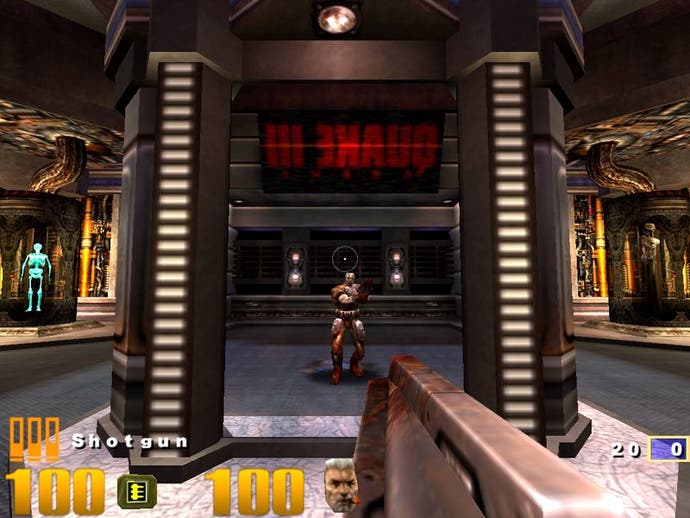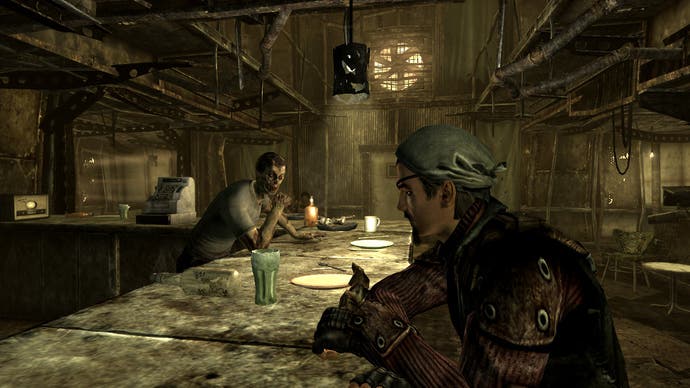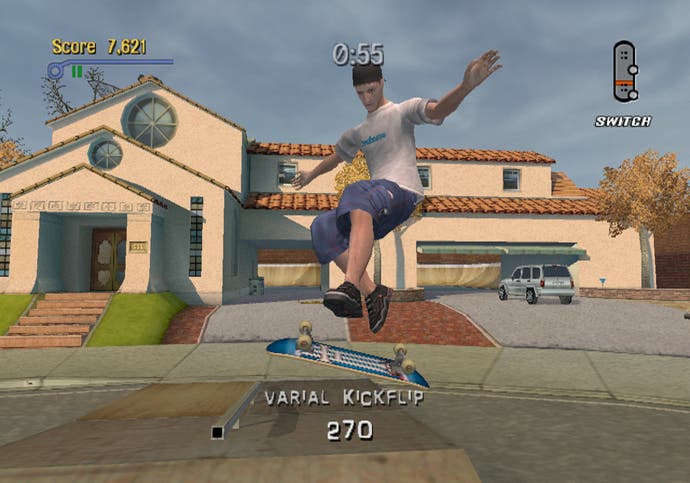Eurogamer's Lifetime Top 10
Editors past and present have a 10th-birthday squabble over what's best.
9. Quake III Arena
id Software / PC
Special Guest Star Rupert Loman: The Quake series means more to me than any other game. Quakeworld was my first experience of online gaming (stealing time on my dad's PC) and Quake 2 was instrumental in my brother and I starting Eurogamer - having previously run Quake 2 LAN parties and online leagues after school. But the Quake III demo gave us a scare when it was released - bounce pads, a laggy lightning gun, messed up air control, levels hovering in space...
But it turned out id Software knew what it was doing all along - Quake III Arena is the best multiplayer experience that has ever been created. I can still remember learning all the maps, endlessly tweaking my graphics settings and travelling around the world to play in tournaments. I played against two World #1's in my short professional gaming career - Thresh and Fatal1ty - before I realised I was better at organising than playing. (I lost both.)
And Quake 4 was rubbish.
Tom Bramwell: The railgun ruined my life, you know. Back when all this was just Quakeworld, the rocket launcher was king, with a bit of switching to the others as situations developed. I was fantastic at that. Then Quake II came along. I was not fantastic at Quake II. The railgun was the birth of true "twitch" shooters, for me, and, along with Counter-Strike's AWP, probably also the reason it took some of us a while to get used to twin-stick console controls. Quake III Arena finally sold me on the idea, and I think the main reasons were nothing more complex than aural feedback.
Competitive Quake had long relied on sound cues for tactical awareness, but the hum of the railgun coupled with the "chnk!" of each damage-dealing hit completed some sort of vital sensory loop for me, and the bond was joined. Between that, Q3Tourney4, The Longest Yard and Rocket Arena 3, we had a deal.
Rob Fahey: Q3A was the perfect nineties FPS game, demanding insane reaction times, stunning knowledge of the arenas and pinpoint precision from its players. But by this stage, we'd all played Counter-Strike - we'd had a taste of the slower, more lethal and more tactical play that realistic weapons and physics could provide. Quake's days were numbered. Q3A was a fitting swansong, but a swansong nonetheless.
Kristan Reed: At the back end of the nineties when even the casual hardcore bought two graphics cards a year, we were all impatiently wondering what next-generation games were going to look like. In its usual off-the-cuff style, just a few days before Christmas 1999, id provided that answer with a title that was part tech demo, part gameplay demo for every other developer to aspire to.

And just like every other multiplayer FPS before or since, I got my arse handed to me so many times I walked backwards just to mix things up. Yes, I was the very definition of cannon fodder, and never did get invited to join a clan or wear a sponsored AMD t-shirt, or have a clever eed hotmail address. It is, however, one of the main reasons I got so good at single-player games.
John Bye: I spent far more time watching other people playing Quake III Arena than playing it myself, as its pared-down arcade-style gameplay made it the ideal choice for deathmatch tournaments. The game's release saw a boom in "professional gaming", with the world's top players taking home hundreds of thousands of dollars in prize money at the sport's peak. By comparison, all I ever won playing Unreal Tournament was a backpack and a £20 gift voucher.
One of my fondest memories from my time at Eurogamer was spending the week of my 23rd birthday in a caffeine-fuelled frenzy at the Razer CPL tournament in Dallas, pumping out a frankly ridiculous 40+ pages of live coverage, whilst rubbing shoulders with the likes of John Carmack and John Romero, and hanging out with some of the best Quake players in the world.
I'd like to give a special thanks to event sponsor Bawls, whose supply of free energy drinks kept me running back and forth between the tournament hall and my hotel room every half hour for three days straight to type up the latest news and match reports. How I didn't drop dead from heart failure halfway through the weekend I'll never know...
Johnny Minkley: I've always been predominantly a console gamer, so - with the exception of a university year lost to GoldenEye - my FPS experience was 'limited' to say the least when I started working for Emap on CVG magazine in 2000. Quake III Arena was the lunchtime fix across the games department, and though I was never any good at it, I don't think I've experienced anything since of quite such clinical, relentless, devastating brutality. Wonderful.
8. Fallout 3
Bethesda Softworks / PC, PS3, Xbox 360
Rob Fahey: Lots of games let you choose between good and evil, but it feels like an artificial choice - "press X now to be evil!" Fallout 3 made you pick your path much more organically, and allowed not only for the extremes, but for shades of gray in between. It muddled its morality beautifully - how many of us, certain that we were being righteous and just, managed to get the sheriff killed and left his son an orphan? It's a rare game that dares to suggest that there isn't always a right answer. Blurred lines, backfiring moral choices and confused morals make Fallout 3 into a game to truly cherish.

Kristan Reed: People chuck around the phrase 'Oblivion with guns' like it was a bad thing. For me that was precisely what I was after. But as it turned out, I found it more of a survival horror RPG than a dumb FPS-RPG. Creeping around decaying relics capping ghouls was scary enough, but it was always the moment when you were morally conflicted where Fallout 3 really got its hooks into you. Full of reprehensible characters with often quite despicable agendas, it was predictably easy to play the bad guy. Blowing up Megaton wasn't ever something I was going to do, but eventually someone would end up getting you to do something absolutely terrible. My worst decision? Capturing people for the slave camp for money. It doesn't get much lower than that. Apart from, perhaps, letting the ghouls into Tenpenny tower...
Ellie Gibson: I was hoping Fallout 3 would be a lot more like Threads than it actually is. Why hasn't anyone done a proper videogame tie-in for that, anyway? Guaranteed Christmas number one.
7. Tony Hawk's Pro Skater 3
Activision / Neversoft / PS2, Xbox
Rob Fahey: My mother never said this, but in fictional terms, she's meant to have said that if you don't have anything good to say, you should say nothing. I'm saying nothing.
Oli Welsh: I'm called Oli and I like grinding. But I don't do skateboards, sorry. It's no Super Monkey Ball.
Kristan Reed:Tony Hawk's was always one of those series that I wished I was good at, but never was. I tried repeatedly to get into both of these games, fully aware that they were supposed to be works of genius, but somehow my hands refused to buy into the multi-button, combo-strewn mechanics required to enjoy them. The same reason I still suck at Street Fighter, then.

Ellie Gibson: Interviewing Tony Hawk was one of my highlights of the 2007 Leipzig Games Conference. We only got to share a few minutes together, but I like to think they were as special for him as they were for me. He smells of money.
Tom Bramwell: When we first started compiling this list, I didn't expect to see a Tony Hawk game anywhere on it. I'd long forgotten about Tony Hawk. But the people who elevated it to this position - the chaps in the Eurogamer tech bunker, predominantly - are onto something. Remember when NHL games were popular in the UK? It's because they played nothing like ice hockey; they were just fabulous, competitive impressions of a popular sport. It all went to s*** with polygons and analogue sticks.
Skateboarding has kind of had its cake and eaten it too in that respect, with the Skate games doing a wonderful job of rebooting the concept, and Tony Hawk: Ride perhaps taking it to the logical extreme. OK, I'm yet to be convinced on that one, but the point is that skateboarding survived the transition and proven successful across the world on both occasions. The transition itself, though, is what I take issue with, because it had to happen at the expense of games like Tony Hawk's Pro Skater 2 and 3, even though nothing - not SSX, not Amped, and certainly nothing involving pushbikes - has ever better combined spazzy, Street Fighter-style button combinations, reaction-based path-finding and wiggling a stick for balance.
